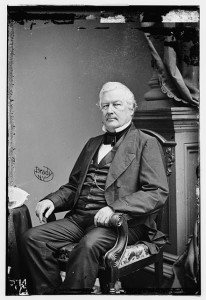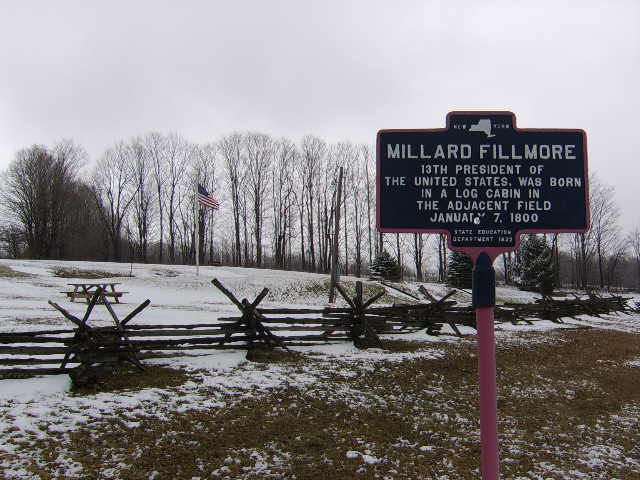In addition to New York City and Albany, Buffalo opened a fair on Washington’s Birthday in 1864. 150 years ago today a Richmond newspaper published some of Millard Fillmore’s remarks. Mr. Fillmore thought the rebel army should be destroyed with as little collateral damage as possible, then offer the deluded southern masses forgiveness and reconciliation. From the Richmond Daily Dispatch March 25 1864:
Ex-President Fillmore on the War.
–The Northern papers bring us the first expression of opinion on the war that we have seen from Millard Fillmore. At the opening of the great Central. Fair, at St. James’s Hall, Buffalo, he is reported to have spoken as follows:
Three years of civil war have desolated the fairest portion of our land; loaded the country with an enormous debt that the sweat of millions yet unborn must be taxed to pay; arrayed brother against brother and father against [s]on in mortal conflict; deluged our country with fraternal blood; whitened our battle finds with the bo[nes] of the slain, and darkened the sky with the pall of mourning. Yet these appalling calamities — which as yet have touched our city more lightly than any other in the land — have imposed upon us new duties, which must be promptly met and gener[ously] discharged, and new burdens which must be patiently and cheerfully borne.
We cannot, in our humble capacity, control the events of this desolating war. We hear its thunders and mark the track of desolation, and we must meet the emergency as best we can, but never despair of the [R]epublic. It is no time now to inquire whether it might have been avoided. Let those who seek light on this subject read Washington’s Farewell Add[r]ess. Nor are we now to criticise the conduct of those who control it, awarding praise here and bestowing censure there. The impartial historian will [do] this when the passions engendered by the strife have cooled, and partisan prejudice, petty jealousies, malignant envy, and intriguing, selfish ambition shall be laid in the dust, and, it is hoped, buried in oblivion. As much less are we called upon to predict when or how this war will end. Let those who seek light on the subject read Gen. Jackson’s Farewell Address.
But let us hope an all-wise, and merciful Providence will incline the hearts of the people, North and South, to peace — to a lasting peace, with a restored Union, c[e]mmented by fraternal affection, under our well-tried and glorious Constitution.
Nor is this the time or place to express an opinion as to the policy then should be pursued to reach so desirable an end. But one thing is clear, that much must be forgiven, if not forgotten, on both sides, before this Union can ever be restored; and therefore, it in to be hoped that all unnecessary acts of cruelty or wanton destruction of private property, or insult, or insolence in triumphing over a fallen foe should be avoided; for all such acts only fire the heart of our adversary with resentment and revenge and thus protract the war, increase its h[orrors], and leave a sting which will reader reunion more difficult, it not impossible.
But it must be apparent to all that the first step toward bringing this war to a close is to conquer the [rebel] army. Any negotiations for peace before this is done would prove abortive; and any professed clemency to those in arms who d[efy] our power would be a mockery which would be treated with ridicule and contempt. But, when we have conquered their armies and disposed of their leaders, then let us show our magnanimity and generosity by winning back the deluded multitude who have been seduced or coerced into this rebellion, by extending to them every act of clemency and kindness in our power, and by restoring them to all their rights under the Constitution. This I conceive to be Christian forgiveness and the best policy, and the only one which can ever restore this Union.
You can read a more complete account of the speech here.
Not everyone had the same attitude about private southern property. From the same issue:
Devastation by Sherman.
–The Brandon (Miss) Republican publishes a list of nearly a column in length of the losses of private citizens by the Yankee’s with Sherman. They range from $1,000 to $100,000. Among the heaviest cosers are: In Brandon, A G Mayers $70,000; W B Lancaster’ $60,000; B F H Lamb, $60,000; Henry & Tappan’ $40,000–in Rankin, R Shotwell & Son, $100,000; Mrs. Melton, $75,000; Dr. H H Parker, $50,000; H Battle, $45,000; A C Miller, $40,000; and Mrs. Ratcliff, $40,000.
During the Civil War Millard Fillmore
denounced secession, and supported the Union war effort, but also became a constant critic of the war policies of President Lincoln, such as the Emancipation Proclamation.
He commanded the Union Continentals, a corps of home guards of males over the age of 45 from the upstate New York area. The Continentals trained to defend the Buffalo area in the event of a Confederate attack, as happened in the St. Albans Raid, and was planned for Johnson’s Island. They performed military drill and ceremonial functions at parades, funerals, and other events. The Union Continentals guarded Lincoln’s funeral train in Buffalo. They continued operations after the war, and Fillmore remained active with them almost until his death.
The 13th U.S. president was born in southern Cayuga County, New York. The image is licensed by Creative Commons.


